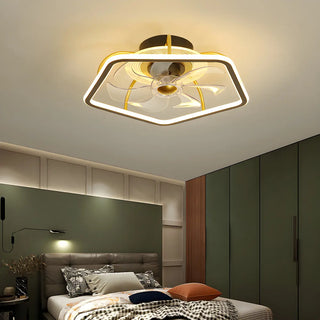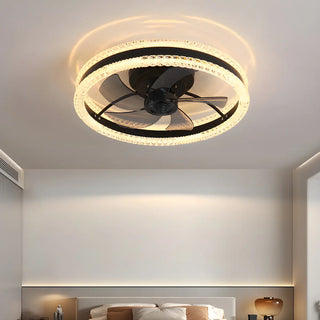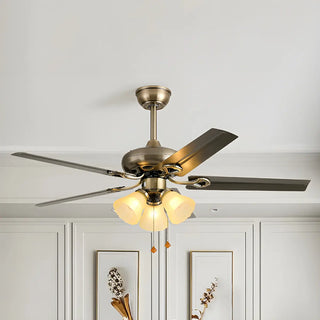When picking a bedroom ceiling fan, looks aren’t the whole story—you’ve got to think about how it feels, too.
A fan that’s too petite for your space won’t do squat on sticky summer nights, leaving you tossing in a pool of sweat. On the flip side, a massive fan might blast you with icy gusts or hum like a jet engine, turning your zen bedroom into a wind tunnel.
Getting the size just right? That’s the sweet spot for staying comfy, saving energy, and keeping your budget in check.
That’s why we have created this guide to help you choose the ideal ceiling fan size for your bedroom. We will help you find the ideal bedroom ceiling fan size so you can sleep comfortably and save energy. Let’s dive in!
Why Ceiling Fan Size Matters for Bedrooms
If you are wondering why you should even consider the ceiling fan size for your bedroom, well, you should consider it because your fan size will create a comfortable atmosphere and help circulate air in every corner of the bedroom.
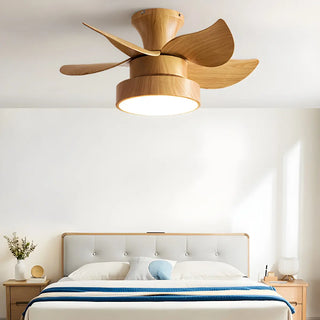
Once you go with a fan that is suitable for your bedroom size, you get to ensure that air is circulating and reaching every corner of your bedroom. A fan too big or too small for your bedroom size will be uncomfortable and also air will not be reaching every corner of your space.
Besides just temperature control, a well-chosen ceiling fan of recommended size will also operate more quietly at lower speeds. This will create a peaceful sleeping environment for you.
It also maintains better balance, reducing wobble and noise that can disturb sleep. This careful sizing consideration makes sure your fan becomes both a functional and aesthetic asset to your bedroom.
Ceiling Fan Size Chart for Bedrooms (2025 Guide)
Without a doubt, choosing the right ceiling fan size makes all the difference in bedroom comfort. And to help you choose the right ceiling fan size, we have discussed below in detail some key points to consider for small, medium, and large bedrooms.
Ceiling Fan Size Reference Chart
|
Room Size (Sq. Ft.) |
Recommended Blade Span |
CFM Range |
Best Applications |
|
Under 100 |
34"-42" |
1,500-3,000 |
Small bedrooms, home offices |
|
100-200 |
44"-50" |
3,000-5,000 |
Standard bedrooms (12x12) |
|
200+ |
60" or dual 52" |
5,000+ |
Master bedrooms, large suites |
1)Best Fan Size for Small Bedrooms (Under 100 Sq. Ft.)
For a small bedroom under 100 square feet, a fan of 34 to 42 inches will work well. Such smaller fans provide the right amount of airflow without overpowering the bedroom.
And, the moderate blade span on such fans will create gentle circulation that's ideal for tight corners, preventing the stuffy feeling that can occur in small rooms. In order to save space, you can choose a ceiling fan with light, and you will be able to solve both lighting and blowing problems.
If I could give you an example, a Low-profile hugger model fan is a particularly good choice here, as they maintain proper clearance in rooms with standard 8-foot ceilings while delivering quiet, efficient performance.
2)Ideal Fan Size for 12x12 Bedrooms (144 Sq. Ft.)
The classic 12x12 bedroom needs a slightly larger ceiling fan than a small bedroom fan recommendation to circulate air effectively. For 144 Sq. Ft 42 to 50-inch model fan hits the sweet spot for these medium-sized spaces.
When considering what size ceiling fan for your 12x12 bedroom, you should remember that this mid-range size of ceiling fan moves enough air to keep the entire room comfortable while operating quietly at lower speeds. The balanced proportions also look right in the space. It is neither too small to be effective nor too large to dominate the room visually.
3)Large Bedrooms (200+ Sq. Ft.)
If you own a spacious master bedroom of over 200 square feet, you need a fan that fits your room's unique cooling challenges. You have two excellent options for such a bedroom; you can either go with a single extra-large fan (60 inches or more) or two standard 52-inch fans placed strategically in the bedroom.
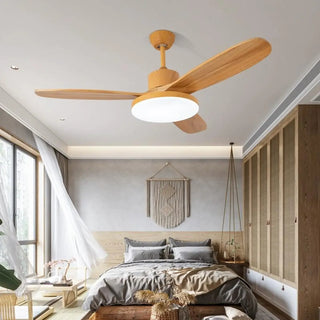
If you have high ceilings in your large bedroom, then the single large fan solution will work well because the extended blades can move substantial air volumes. However, for particularly large or rectangular rooms, you can install two properly spaced 52-inch fans often provides more even coverage in your big bedroom.
This dual-fan approach allows both units to run at lower, quieter speeds while still maintaining excellent airflow throughout the space. This setup can be especially effective in bedroom suites or rooms with sitting areas that need consistent temperature regulation.
How to Determine the Right Ceiling Fan Size for My Bedroom?
You can follow the professional techniques given below to determine the ideal fan size for your bedroom.
1: Measure Your Bedroom
Measuring comes as a first step, even when you are looking to buy the right size ceiling fan for your bedroom. This is how you can do it. You have to find out your bedroom length and width in feet and multiply those values to find out the square footage of your bedroom.
Once you know what size your bedroom is, you can compare it with our above chart for ceiling fan size recommendations for bedrooms to find out in which category your room falls.
After that, you can compare your answer with our above-given ceiling fan size chart to know which category your bedroom falls in.
And for irregular-shaped rooms, you should divide the space into rectangular sections, calculate each area separately, then sum the totals. You should not forget to calculate for walk-in closets, too, because those also affect air circulation.
2: Ceiling Height and Down Rod Considerations
Your ceiling height dramatically impacts your ceiling fan selection and installation requirements. If you have a standard 8-foot ceiling, you will typically need low-profile flush-mount ceiling fans or very short down rods (3-5 inches) to maintain the recommended 7-foot minimum clearance from the floor.
And if you have got a ceiling of 9-10 feet, then you can position your fan to a 6-12 inch down rod for optimal air circulation.
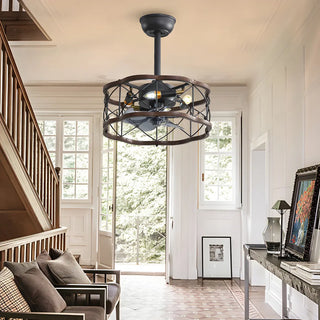
But, if you have vaulted ceilings in your bedroom, then you need to make some significant changes. Selecting a downrod ceiling fan, for that a general rule is that you have to add 1 inch of down rod length for every added foot of ceiling height that is beyond 9 feet.
So, a 12-foot ceiling would require approximately a 24-inch down rod. This will position the fan in the ideal airflow zone while maintaining safety and visual proportions.
3: Account for Room Features and Obstructions
You should also consider your bedroom's architectural features before finalizing fan size. You should consider:
-
Sloped or angled ceilings that may require special mounting hardware
-
Light fixtures or ceiling beams that could interfere with blade rotation
-
Bed placement that might affect the airflow direction
-
Windows or doors that create natural air currents
If you have any of these factors, you have to adjust your size selection slightly or choose a fan with specific mounting capabilities.
Matching Your Ceiling Fan with Your Bedroom Aesthetic
Other than providing optimal comfort, your ceiling fan should complement your bedroom's decor. Let’s face it, in 2025, nobody wants to compromise on their bedroom look and vibe.
The right style will enhance your space's visual appeal without compromising ceiling fan functionality. Let’s see how you can match your ceiling fan you’re your bedroom aesthetic.
Sleek Low-Profile Fans for Small Spaces
In small bedrooms, you should go with a streamlined ceiling fan that will visually breathe your room while also maximizing airflow efficiency. You should go with low-profile hugger models because they work particularly well in rooms with standard 8-foot ceilings while maintaining proper clearance without sacrificing style.
You can also consider these design-forward options:
-
Minimalist metallic finishes (brushed nickel, matte black) for contemporary spaces
-
Wooden blade options with light or dark stains to complement existing furniture
-
Enclosed motor housings for a clean, uncluttered appearance
Statement-Making Fans for Large Bedrooms
Spacious master bedrooms deserve a ceiling fan that makes an elegant design statement while moving substantial air volume. These grander spaces can accommodate more dramatic proportions and decorative details:
-
Wider blade spans (60"+) with distinctive shapes or finishes
-
Artisanal materials like reclaimed wood, hand-forged metal, or hand-painted details
-
Multi-light configurations with designer glass shades
-
Distinctive motor housings featuring decorative elements
And you should consider fans with oil-rubbed bronze finishes and carved wood blades for traditional bedrooms. Contemporary spaces shine with fans featuring abstract blade designs and satin metallic finishes. The extra visual weight of these statement pieces balances the proportions of large bedrooms while serving as a striking focal point.
Find Your Perfect Ceiling Fan Today with Zowala
Choosing the right ceiling fan renovates your bedroom into a comfortable retreat. In this guide, we've shown you how you can properly size your bedroom fan, add smart features to it, and style it in a way that works to create the ideal vibe and sleeping environment for you.
And if you are looking for a place to buy a stylish and functional ceiling fan for your bedroom, you can check out Zowala's high-end bedroom ceiling fan collections.
We have got everything from fixtures to fans that you could think of for a home. You can also contact us to discuss your bedroom and home renovation needs.
Frequently Asked Questions
Q1: How low should a ceiling fan hang in a bedroom?
A: Maintain at least 7 feet clearance from the floor to the blades. For 8-foot ceilings, use flush-mount or low-profile fans; higher ceilings need down rods (add 1" per foot over 9').
Q2: Can I install a ceiling fan by myself?
A: You can install your ceiling fan by yourself. But, you should go with a professional installation so that you make sure the fan wiring is done properly for safety, especially for larger/heavier models.
Q3: Do smart ceiling fans work with all bedroom sizes?
A: Yes! Smart features work independently of size. Choose your preferred blade span first, then select smart capabilities (app control, voice commands, etc.). Many models offer customizable options.







